In our VIENNALE DAILIES you'll find everything you need to know about what's happening around the festival!
"I hope you like the film despite or actually because of its length" (Reinhold Vorschneider)
YOU CAN FIND MORE PICTURES OF YESTERDAY IN OUR GALLERY!

NEED SOME FILMTIPS? HERE ARE SOME HIGHLIGHTS!


HA'BERECH
Nadav Lapid
25.10.: 17:00 - GARTENBAUKINO
26.10.: 20:30 - STADTKINO IM KÜNSTLERHAUS
Nadav Lapid’s filmmaking has a freedom that feels thrilling and genuinely risky, and with his latest movie, he films an antihero who rebels against a state that seeks to destroy any such sense of danger or challenge to their authority. Named simply “Y,” the lead character is an Israeli filmmaker (a riveting Avshalom Pollak) who is invited to a town in the desert hinterlands to introduce a screening of one of his movies. His guide is a sunny, well-meaning library administrator who surprises him with her youth and kindness. But she also carries out the Ministry of Culture’s demands: artists at government-funded events must sign a form declaring the safe topics they will discuss. Like other Lapid protagonists, Y is an iconoclast who is engrossing to watch, and yet he is also possessed with a self-righteous fury that, while understandable, is also tragic. Building up the confrontation with crackling dialogue and flares of humor along the way, Lapid captures Y’s watchfulness and ferocity through visceral camerawork and subjective sound design that convey the tension and wonder of being in a room with another human being. At the heart of its fearless political insights is something that many films claim to do but fail at doing: embark on a genuine search for a way forward in a world that keeps eroding the first principles that should be its foundation. (Nic Rapold)


MARX PUO' ASPETTARE
Marco Bellocchio
25.10.: 23:15 - GARTENBAUKINO
31.10.: 11:00 - URANIA
Psychoanalyst Massimo Fagioli, a friend and collaborator of Marco Bellocchio, once remarked that the director’s artistic greatness arises from the fact that he is a “great depressive” who risks the “destruction of his individual identity”. Every fan of Bellocchio’s cinema recognizes its underlying autobiographical elements, especially in relation to his close-knit family.
In MARX CAN WAIT, he exposes a particular, crucial trauma: the suicide at 29 of his depressed twin brother Camillo. It happened in 1968, when Marco’s revolutionary fervor somewhat blinded him to Camillo’s deep-seated problems. In this beautiful documentary, the remaining members of the Bellocchio family gather to piece together – sometimes in conflicting accounts – this troubled past. Other friends and specialists are also called upon to comment.
Punctuated with vivid clips from the director’s fiction work (FISTS IN THE POCKET, LEAP INTO THE VOID, MY MOTHER’S SMILE), this investigation intermingles lucidity with longstanding feelings of guilt and regret – and is especially memorable for the disapproving looks with which Marco’s adult children, Elena and Pier Giorgio, greet his self-justifications and evasions. (Ferdinand Keller)


1970
Tomasz Wolski
25.10.: 13:00 - STADTKINO IM KÜNSTLERHAUS
This original film is structured around audio recordings of telephone calls in which Polish government officials communicated with each other during a tense political situation from 1970. The trigger of the conflict that made people take to the streets was an increase in the price of meat in the midst of an already economically difficult situation. Politicians had no better idea than to simply send the police to break up the demonstrations. Wolski obtained the audio recordings of these conversations between those officials and used stop-motion animation to make them come alive, turning each of these political figures into cartoonish versions of themselves.
Although the number of characters at times may disorient the viewer, Wolski creates an unavoidable tension with regards to a demonstration that will spread to several cities through the country. Wolski adds crude newsreel images to the animation scenes in gloomy government halls that give a clearer and more direct account of the concrete consequences of these conversations. The film perfectly captures the distance between these plastic creatures who give orders and the real people who suffer them. (Diego Lerer)


THE FIRST 54 YEARS
- AN ABBREVIATED MANUAL FOR MILITARY OCCUPATION
Avi Mograbi
25.10.: 20:30 - STADTKINO IM KÜNSTLERHAUS
26.10.: 15:00 - STADTKINO IM KÜNSTLERHAUS
In a somewhat anonymous living room, a so-called professor played by Avi Mograbi himself gives a lecture on the long term strategy used by Israel in its now 54-year occupation of Palestine. With the cold distance expected by his status, the teacher explains the military and political thinking behind one of the longest military occupations in history. Veterans of the Israeli army testify before the camera about their missions to provide painful evidence of his theories, while footage of the abuses toward the civil population haunt the screen and our consciences. Avi Mograbi is the director who has perhaps investigated and denounced the consequences of the Israeli occupation of the West Bank and the Gaza most. His work speaks clearly to cinema’s capacity to give meaning to images otherwise muted and banalized by the machine of information. His presence on the screen, which is, as usual in his films, far from anecdotal, gives a strong statement on his artistic engagement. The contrast between the cynicism and sarcasm shown by Mograbi’s character and the shocking violence of the footage will oblige even the most informed spectator to rethink their understanding of the conflict. (Rebecca Depas)
In Anwesenheit von Avi Mograbi.

UNA PELÍCULA DE POLICÍAS
Alonso Ruizpalacios
23.10.: 13:30 - STADTKINO IM KÜNSTLERHAUS
26.10.: 16:00 - METRO, HISTORISCHER SAAL
What is realism anymore when it comes to law enforcement on screen, after 100-plus years of representations in film and television? Alonso Ruizpalacios takes a characteristically imaginative approach to the problem of portraying the police, looking at two cops patrolling the millions-strong metropolis of Mexico City. A tag-along documentary style opens the film as each cop walks us through his job, talking to the camera, which often seems to be impossibly well placed. Just when the behind-the-scenes conventions might become routine, Ruizpalacios lifts off the lid: the two actors who have been portraying the two officers (who are also a couple) talk about playing their roles. Yet another cross-section of reality emerges through the hardboiled testimony of the two actual cops who are the basis of the characters. Spiking the film are snippets of Lalo Schifrin, which evoke a whole era of scuzzy-glam policing in cinema. But instead of just playing a clever meta-cinematic game, the film lucidly elaborates on the performance of authority that goes into policing – literally, embodying the law in human form – and lays bare the insidious, chilling corruption that entangles both sides of the cop-and-criminal equation in Mexico. Leaping ahead with his latest feature, Ruizpalacios accomplishes a sociocultural excavation of the reality that literally governs our daily lives. (Nic Rapold)
SOME OF OUR GUESTS TODAY!

Maria Speth
Director of
HERR BACHMANN UND SEINE KLASSE
Ignacio Ceroi
Director of
QUÉ SERÁ DEL VERANO
Julian Radlmeier
Director of
BLUTSAUGER
Alexandre Koberizde
Actor in
BLUTSAUGER & Director of
RAS VKHEDAVT, RODESAC CAS VUKUREBT?

Ekaterina Selenkina
Director of
OBKHODNIYE PUTI
Daniel Hoesl
Director of
BLUTSAUGER
Ramon Zürcher
Director of
DAS MÄDCHEN UND DIE SPINNE
Silvan Zürcher
Director of
DAS MÄDCHEN UND DIE SPINNE

Swamy Rotolo
Director of
A CHIARA
Antonia Fumo
Actress in
A CHIARA
David Koberidze
Actress in
RAS VKHEDAVT, RODESAC CAS VUKUREBT?
Giorgi Koberidze
Composer in
RAS VKHEDAVT, RODESAC CAS VUKUREBT?
Mathieu Amalric
Director of
SERRE MOI FORT
Anita Rocha da Silveira
Director of
MEDUSA
WHAT'S HAPPENING AT THE VIENNALE BAR TODAY?
Saturday, October 23:
BAR: Al Tropical
CLUB: Mike Burns & Xela L (Club Majik/Distance Learning)
KENNEN SIE UNSERE CARRIER BAGS?

So far the Viennale hasn’t featured many Teenage Mutant Ninja Turtles on the big screen.KELTI is about to put this to rights: The young Minja is celebrating her birthday with a Ninja Turtles theme, which is why she and her classmates are seen running around a suburban living room in Belgrade dressed up like turtles.
Read more HERE - you can find all CARRIER BAGS in our Blog!
VIDEO OF THE DAY
PRESS
Wiener Zeitung: Viennale: "Abtreibung ist immer noch ein Tabu"

